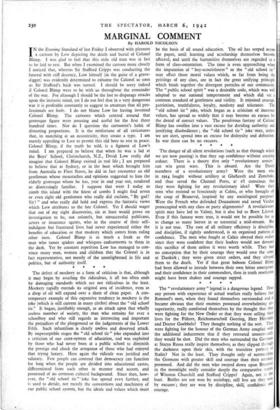The defect of mockery as a form of criticism is
that, although it may begin by assailing the ridiculous, it all too often ends by damaging standards which are not ridiculous in the least. Mockery rapidly extends its original area of incidence, even as a drop of oil will expand over a sheet of clean paper. A con- temporary example of this expansive tendency in mockery is the joke (which is still current in many circles) about the " old school tie." It began, justifiably enough, as an attack upon that wholly useless member of society, the man who remains for ever a schoolboy and who still regards as interesting and important the prejudices of the playground or the judgements of the Lower Fifth. Such infantilism is dearly useless and deserved attack. By imperceptible stages the " old school tie " joke expanded into a criticism of our caste-system of education, and was exploited by those who had never been at a public school to diminish the prestige and check the arrogance of those who had enjoyed that trying luxury. Here again the ridicule was justified and salutary. Few people can contend that democracy can function for long when the people are divided into educational castes, differentiated from each other in manner and accent, and possessed of no common cultural background. Since then, how- ever, the " old school tie "'joke has spread even further, and is used to deride, not merely the conventions and machinery of our public school system, but the ideals and values which must the paper, until learning and scholarship themselves become affected, and until the humanities themselves are regarded as a
form of class-ostentation. The time is even approaching when the imputation of " boy-scoutishness " or the " old school tie" may affect those moral values which, so far from being the
privilege of any class, are in fact the great unifying principle which binds together,the divergent particles of our community. The " public school spirit " was a desirable code, which was well adapted to our national temperament and which did set a common standard -of gentleness and virility. It enjoined courage, patriotism, truthfulness, loyalty, modesty and tolerance. The "old school tie" joke, which began as a criticism of incorrect values, has spread so widely that it may become an excuse for the denial of correct values. The ponderous fantasy of Colonel Blimp has swollen into a vast excuse for deriding authority and justifying disobedience ; the " old school tie " joke' may, unless we are alert, spread into an excuse for disloyalty and defeatism. In war there can be no excuses.
- * * * * sound be of all seeped across education. The oil has


























 Previous page
Previous page